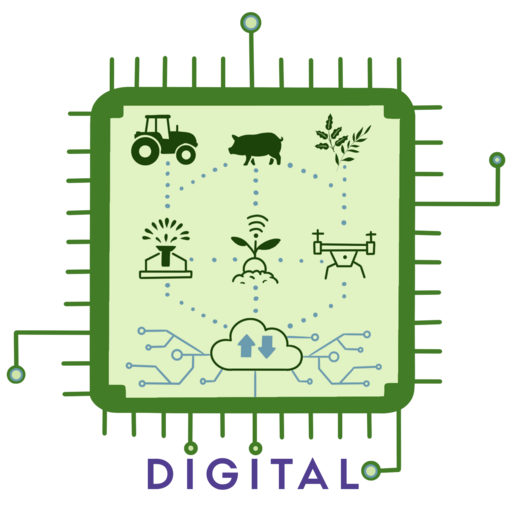Digitalization and infrastructure (DIGITAL)
What are the main challenges
Challenge 1: Digital-first agri-food transformation
Digitalization is the necessary precondition for scalable and sustainable agri-food systems. As sustainable agri-food systems involve the large-scale coordination of farming operations, resource use, food chains, and value flows, they inherently rely on extensive digital device and infrastructure technologies and on their resulting data and information chains.
Unlocking the potential of digitalization and data technologies involves academic challenges like purpose-driven design and specification of information management systems, purpose driven data/information requirement specification, big data analytics, development of digital twins, data interoperability (technical and semantical) data standards, and user adoption.
One of the major challenges to unlock the potential of agricultural data is these data’s diversity in terms of format and content, fragmentation, metadata description, standards, and semantics, which means that the interoperability problem exists both at the technical and semantic level.
Another key challenge is the lack of reference data (ground truth data) sets to validate satellite, drone, and other sensor data generated in the agro-food system. This includes reference data to strengthen AI capabilities in agriculture.
Challenge 2: Systemic approach to agri-food digitalization
As digital technologies, infrastructures, and data are prerequisites for a sustainable agri-food system transformation, the challenge of digitalization is not incremental, but represents a fundamental and disruptive socio-technical transformation of the entire food production system, its technologies, and its practices, in other words a “change of minds”. This separates digitalization from previous and other technology innovations in the agri-food domain. Digital transformation of agri-food systems therefore requires a systemic approach to digitalization that looks beyond individual technologies to explore interconnected technological systems such as IoT and sensor networks, and data ecosystems, as well as how they interact with agricultural, ecological, economic, and regulatory systems. The key next step of agri-food digitalization is to move from increasing operational efficiency for manual processes to hyper-automation, where intelligent digitalization (AI/ML) will orchestrate redesign and new business processes.
A systemic approach to sustainable agri-food digital transformation therefore integrates across:
- User-level digitalization: Changing materiality of agricultural practices including new digital objects, tasks, and skills.
- Farm-level digitalization: Management transformation in the form of new production systems and processes, resource management practices, and sustainable digital business models.
- Agri-food chain digitalization: Data-enabled transformation to shorten logistics and retail chains, bringing production, retail, and consumers closer together in new forms of relationships.
- Policy-level digitalization: Transformation in agri-food system modelling, monitoring, and data analytics to provide better insights for the policy and regulatory decisions that provide better governance, incentive, and accountability structures.
Challenge 3: Interdisciplinary digital innovation
Innovation, implementation, and operationalization of digital technologies are not just physical interventions, but a series of actions that can change people’s behavior and the socioeconomic context. Digital innovation addresses how humans interact with, organize around, and shape technology, specifically digital technology. In this regard, there is high demand to combine studies from the social science and humanities (SSH) with biological and engineering sciences.
Digitalization is often confronted with the “problem of implementation“ requiring the understanding that digital/data technologies are not just replacing old technologies and practices “one-to-one”. These new data technologies are fundamental different and have to be seen as part of a socio-technical practice, where it often changes the very practice it is a part of, while at the same time complying with a number of constraints. The problem of implementation is therefore also tightly connected with relevance and value creation from digitalization and its resulting data chains.
In general, digitalization calls for a more interdisciplinary approach that involves competences like data science, computer science, data analytics, system engineering (AI, ML, BigData), communication technologies, social science/economics/business/organization, production and operations management, biological science and extensive domain knowledge, governance, and management, and SSH. Digitalization must be analyzed and evaluated at system-level and not only at device-level.
An emerged interesting theme focuses on the value of information created by digitalization. This is closely related to the modelling and decision support systems developed and sustained by data technologies. This involves socio-economic analyses, quantifying the financial measures of data technologies, verifying the benefits of data technologies, how to communicate these benefits, how to identify beneficiaries, and how to provide training.
Future research agendas within digitalization will include digitally enabled socio-cyber-physical-ecological system developments, digitally enabled policy making and monitoring, and digitally enabled agricultural green transition pathways giving way for extensive interdisciplinary and transdisciplinary science.
Key characteristics of the Hub
- Digitalization as an enabler of sustainability, Climate Mitigation, and Green Transition, diversity, policy monitoring.
- Move from digitization (data acquisition) to digitalization (transform data, connect data, create knowledge and improved decisions). Converging technologies (sensor technology, GPS, GIS, etc.)
- Digitalization creates innovations (increased awareness) in terms of managing “sustainability”, “diversity”, “tailored processes”, etc. and fulfil societal goals. Increases capability to adapt
- Interdisciplinary perspectives: Technology - human interaction; governance and regulation, “change of mind”. A new discipline of “system implementation” emerges. Combines research, implementation, domain
- Transformative dimensions of digitalization: New ontologies – novel objects (e.g. virtual objects); New epistemologies – novel ways of knowing (sensor – tacit knowledge); New practices – novel ways of doing (e.g. services); New relations – novel ways of connecting/interacting (e.g. in the supply chain).
What kind of research areas would complement the Hub research?
The application of digital technologies goes beyond physical interventions, involving actions that change people’s behavior and the socioeconomic context. Digital innovation addresses how humans interact with, organize around, and shape technology, specifically digital technology. Contrary to previous technologies, digital technologies and innovations form a system-transition and not only a technology-transition, and as such changes the very practice it is a part of. In this regard, there is high demand to combine studies from the social science and humanities (SSH) with technical and engineering sciences (STEM) involving both technical advances and human adoption challenges.
Hub activities
Brokage Event; Horizon Europe Cluster 6 Calls 2024
The DIGITAL Hub is participating in the EU Brokage Event in Brussel 26 September 2023. The main part of the event will comprise bilateral meetings between participants from Europe and beyond interested in the same topics, seeking to share new project ideas and find collaboration partners. Thus, the brokerage event will help you to build your consortium for the for the upcoming Horizon Europe Cluster 6 Calls 2024.
Academic Coordinators
Claus Aage Grøn Sørensen
Department of Electrical and Computer Engineering - Communication, Control and Automation
Aarhus University
Phone: +45 22 82 75 47
E-mail: claus.soerensen@ece.au.dk
Jonas Valbjørn Andersen
Information Systems and Digital Innovation (ISDI), European Blockchain Center
IT University of Copenhagen
Phone: +45 72 18 51 04
E-mail: jova@itu.dk
Administrative Coordinators
Niels Michael Petersen
Strategic Advisor, Special Advisor
Email: nimp@tek.sdu.dk
Phone: +45 93 50 76 25





